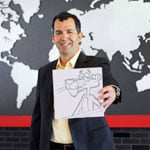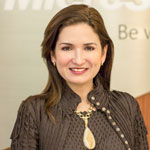2004 was a tough year for Dennis Verges: it was the year he gave up his dream. “I’d boxed from a young age, and I cherished it, I continued to do it when I worked full-time and went to school part time,” he explains. “But, ultimately, I had to make a choice—a choice to have a career.” However, letting go of one dream meant finding another. Today, the half-Puerto Rican and half-Sicilian is the director of credit and collections at Unisource Worldwide, one of the largest independent distributors of paper products in North America, with $4.5 billion in 2011 sales, and he trains several world-class fighters in boxing and mixed martial arts. “I never even expected to go to college, yet I ended up here,” Verges says.
 Straight out of high school I began working in credit collections. The jobs I took were just jobs; there was no career path. So I started going to Harper College in Palatine, Illinois, to get into marketing and
Straight out of high school I began working in credit collections. The jobs I took were just jobs; there was no career path. So I started going to Harper College in Palatine, Illinois, to get into marketing and
public relations.
By the time I finished college, I had three associate’s degrees. They were in business administration, commercial credit management, and financial management. I realized to go into marketing and public relations I’d have to start over in an entry-level position, and I didn’t want to do that. So I stuck with finance, where I already had six or seven years of experience.
In 2004, I gave up boxing. Up to that point, I had been boxing part-time. I wasn’t sure what I wanted to do: be a full-time fighter, a full-time trainer, or a full-time finance guy? But I realized I wasn’t getting younger, and a lot of full-time fighters didn’t have the built-in excuse I did that I lost a fight because I’d just worked a 10-hour day. So I let that dream go. To move on in my career, I had to give away my prize possession, something I’d cherished since I was 10 years old.
I went to a software company, ASAP Software. I took a demotion because it was a growing company. I told my wife I’d stay there for two years, and I stayed almost two years to the day. I received two promotions during that time, but felt that without directly taking over my boss’s position, there was no upward mobility.
I got the job at Unisource through networking. When I was at ASAP Software, I attended all sorts of networking events. Carter Baldwin Executive Search, contracted by Unisource to hire the management team, heard of me and asked me to be on its team. In 2007, I started here as manager of financial services. We were in the process of centralizing out back-office finance functions into a shared-service model. We reduced 30 offices to one. I took all of our West Coast business and turned it into a single group in Chicago— [it] did all of the process writing, hiring, systems conversions and management.
I’ve been promoted twice, most recently to director. My job is to create the same shared services model for other entities—namely Graphic Communications and the Canadian business utilizing the staffing services of Kelly Financial Resources. Although I work long hours, I find my job insanely easy because I’ve found exactly what I like to do most. I’ve always been entrepreneurial and I was taking something that didn’t exist or was broken and creating something new and better.
Around that time I started mentoring. People use a résumé or an interview to show what they can do. A lot of the advice I give people—especially when they’re looking to get promoted—is to use their work instead. I recently passed an employee over for a promotion and she wanted to know why she’d failed her interview. I said, “Every day leading up to today was your interview.”
I’ve now created more balance. I train several world-class fighters in boxing and mixed martial arts. I’ve also opened a small consulting practice that helps entrepreneurs start companies and small businesses achieve better results.
One of my most cherished possessions is a silver business card case. A friend gave it to me. It’s inscribed with a quote from Albert Einstein: “Try not to become a man of success, but rather try to become a man of value.” That has shifted by interactions with others and shaped my priorities from becoming successful via wealth creation to becoming successful via value creation.

